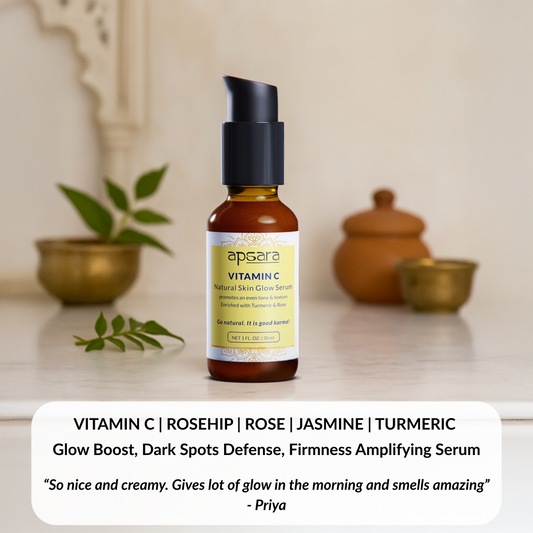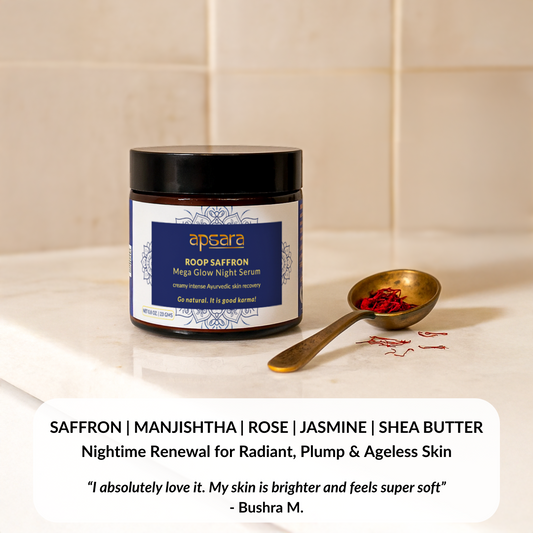Left: Sheetal Rawal, scientist (human genetics) & founder of Apsara Skin Care
By: Marty S.
Home remedies by Sheetal Rawal
Even when the temperature drops outside (for some people, even below zero), having papayas or lemons nearby might remind you of warmer, more relaxing times. Whether you eat them or you drink their juice, these tropical fruits can help you imagine that you’re on a warm, sunny beach instead of being stuck indoors, covered in blankets. Papayas and lemons are highly versatile, and some people even combine the two in various recipes. If this fruity fusion of sweet and sour sounds amazing, just think of how your skin would feel if you gave it this treat instead.
Papayas and lemons contain many skin-beautifying properties, but one element that they share is Vitamin C. Vitamin C is a nutrient that helps revitalize your skin and promote a brighter, more youthful glow. Papayas and lemons are some of the best sources of Vitamin C out there, so combining these ingredients is very beneficial for our skin. Continue reading to discover 3 papaya and lemon Vitamin C face masks that you must use to get glowing skin naturally.
1. Papaya & Lemon Vitamin C Face Mask for Glowing, Youthful Skin
As we mentioned above, Vitamin C is incredibly important for glowing, youthful skin. Why? Vitamin C has been linked to promote the production of collagen. Collagen is a protein that your body produces in order to keep your skin firm and elastic; youthful, plump skin tends to contain a lot of collagen. As you get older, collagen production will start to slow down and collagen will start to break down at a faster rate; this leads to the development of lines and wrinkles. While we aren’t able to completely stop this process, we can slow it down with Vitamin C and make those lines and wrinkles less apparent. Even better, since Vitamin C is an antioxidant, it helps mitigate free radical damage on your skin and further diminish the effects of premature aging.
When it comes to Vitamin C, papayas contain 61 mg while lemons contain 53 mg, per 100 grams. This means that papayas and lemons can not only help fulfill your daily nutritional requirements, but they can also do a lot of anti-aging work on your skin.
Ingredients
1 tbsp. of papaya
10 drops of lemon juice
Oat flour, as needed
Instructions
Mash the papaya into a pulp.
Mix the papaya and lemon together. Add enough oat flour to the mixture until you get a thick paste.
Apply the mask and leave it on for 12 to 15 minutes.
Wash the mask off with warm water. Follow with your toner, serum, and lotion.
Use once a week.
"[Their cleansers are] nice and gentle and they make your skin glow, as you can see. Like hello, I’m not using makeup right now...Invest in Apsara [Skin Care] because it’s natural and it makes your inner glow happen."
2. Papaya Mask to Exfoliate Your Skin and Minimize Lines & Wrinkles
Papayas, however, are not merely defined by Vitamin C. Papayas contain many properties that boost your skin’s natural radiance and help you look years younger. For instance, papain is an enzyme found in papayas that exfoliates your skin. Papain can gently dissolve the dead cells on the upper layers of your skin, thereby revealing more radiant and youthful skin cells. By regularly exfoliating your skin, your lines and wrinkles may start to look more diminished in appearance and your skin might become softer and dewier. Furthermore, besides Vitamin C, there are other nutrients in papayas that make it so healthy for you, such as Vitamin A and Vitamin E. Both Vitamin A and Vitamin E are antioxidants that can eliminate free radical damage as well as minimize skin inflammation.
Ingredients
1 tbsp. of papaya
12 drops of aloe juice
20 drops of fresh apple juice
Rice flour, as needed
Instructions
Mash the papaya into a pulp.
Mix the papaya, aloe juice, and apple juice together. Add enough rice flour to the mixture until you get a thick paste.
Apply the mask and leave it on for 12 to 15 minutes.
Wash the mask off with warm water. Follow with a daily skin care routine based on your skin type. Click here to find out what your skin type is.
Use 1 to 2 times a week.
3. Lemon Mask to Brighten Up Skin & Diminish Dark Spots
Similarly, even though lemons contain a lot of Vitamin C, they still have plenty to offer when it comes to your skin. For instance, lemons have garnered a reputation for being able to brighten up your skin. Lemons can exfoliate your skin because it contains citric acid, an alpha hydroxy acid. Exfoliating your skin can not only diminish lines and wrinkles, but also dark spots and blemishes. As a result, your skin may start to look more even and glowing. Plus, citric acid is antibacterial. This means that lemons can purify your pores of impurities like acne-causing bacteria, which is important if you have any acne spots.
However, you must know that you should never use undiluted lemon juice on your skin. Because of its acidity, undiluted lemon can severely irritate your skin and cause excess dryness, itchiness, or redness. If you plan to use lemon juice, you must dilute it beforehand. If you want to be even more careful, perform a patch test on your skin to see if lemon juice causes any adverse effects.
Ingredients
10 drops of lemon juice
12 drops of orange juice
1 tbsp. of corn flour
Rosewater, as needed
Instructions
Mix the lemon juice, orange juice, and corn flour together. Add enough rosewater to the mixture until you get a thick paste.
Apply and leave the mask on for 12 to 15 minutes.
Wash it off with warm water. Then, use your toner, serum, and lotion.
Use 1 to 2 times a week.
This particular papaya and lemon home remedy is perfect for fading hyperpigmentation and melasma. Watch this video to learn more. Enjoy and don’t forget to subscribe to my YouTube channel!
If you need additional expert skin care advice, fill out this form to get assistance from us soon.
Go natural. It is good karma!



